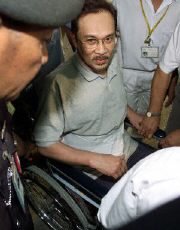 Jailed ex-Malaysian deputy premier Anwar Ibrahim is held by prison guards, police officers and his aide as he kneels in front of his mother's grave during a funeral ceremony at a cemetery in Kuala Lumpur 04 April 2001. Anwar was allowed to attend his mother's funeral with hundreds of supporters showing up for the event. |
It is an obvious case of political doctoring. While the patient suffers in pain, politics cloud the judgment in extending humanity, denying the patient the right to cure. This is the case of Malaysia's jailed former deputy Prime Minister Anwar Ibrahim, whose request to have an overseas operation by a spine specialist has been turned down repeatedly by the authorities.
In the latest development of the medical saga, German spine specialist Dr Thomas Hoogland has ruled out operating on Anwar, citing unwarranted interference of the government and mistrust by the Kuala Lumpur General Hospital (KLGH) director. Hoogland, from the Alpha-Klinik of Munich, Germany, was brought in by Anwar's family to provide him the best and safest surgery for his condition. The government had allowed for the specialist to examine Anwar to assess the possibility of conducting the surgery locally but with strict conditions imposed.
In his medical report, Hoogland stated that Anwar should undergo endoscopic spinal surgery by the end of this month, at the very latest. The procedure would have the lowest risks and best prognosis if performed at the Alpha-Klinik in Munich, and Hoogland said he met with a panel of local medical experts before he came to the conclusion.
Without surgery, Anwar would have to continue enduring a great deal of pain, and there would be a slight risk of paralysis in the future. There is also the fear that his condition could worsen.
The former deputy premier was sacked unceremoniously by Prime Minister Dr Mahathir Mohammad and sentenced to 15 years imprisonment on charges of immoral conduct and corruption. Before his sacking, Anwar was expected to take over the reins from Mahathir, who has been the PM for 18 years. Anwar had denied all charges, saying that the premier and his cronies had concocted the charges to safeguard their wealth and possessions. In a statement to the director of the hospital, Hoogland said the government's attitude and inadequate facilities "forces me to withdraw my option" of operating at KLGH.
Hoogland also said it would be difficult for him to operate at any other hospital in Malaysia because of "negative views" expressed in the local media by some hospital medical staff and the health minister.
"The attitude of the Malaysian government, especially after all discussions and the fact that there in no adequate equipment, forces me to withdraw myself from conducting the endoscopic surgery there. I regret the negative views of KLGH director, the chief anesthetists of KLGH and also the Health Minister in the local media. This has made the situation difficult for me to conduct the surgery in the country," said Hoogland.
 Ex-deputy premier Anwar Ibrahim arrives at the University Hospital in a wheelchair in Kuala Lumpur 03 April 2001. |
The surgeon also expressed regret with the contradicting statements by the KLGH director, who initially had conceded to the inadequateness of the hospital's equipment but then later said that all equipments are available, without taking any steps to acquire the necessary equipment.
Hoogland stated in his medical report that the lacking equipment for the surgery would be difficult to replace. Likening performing the surgery in KLGH to that of "cooking in a strange kitchen", Hoogland said that there was a media war waged against him by the hospital management, further complicating the situation.
"GHKL seemed to question and undermine my professional credibility, for example my views on the local anesthetists. I do not intend to undermine and question the efficiency of local anesthetists," said Hoogland.
Hoogland said that as a medical professional, he has to protect his reputation and for that he has to ensure that not only the equipment, but also the best care and best medical results is achieved.
"I am not ready to make Anwar the trial patient in a serious surgery using equipment that has not been tested," said the specialist, reiterating in Anwar's best interests the surgery should be performed in his clinic in Germany--an option the government has since rejected.
Anwar's lawyer, Sankara Nair, said he had passed on Hoogland's statement to the prisons department chief, asking him to "give weight" to it and to the application for overseas treatment. Meanwhile, the government had insisted that the surgery be conducted locally, with the surgeon and the necessary equipments be flown in.
Mahathir last week had said that if Anwar is allowed to go overseas for surgery, there is the possibility he might not want to return to continue his jail sentence. But Anwar's daughter, Nurul Izzah, had replied to Mahathir's statement at a United Nations Human Rights Convention in Geneva, saying that her father would rather be a p,risoner in his own country than a free man in exile.
Mahathir had also accused Anwar of exaggerating and politicizing his injuries to gain sympathy. The PM, who referred to Anwar's spinal problem, as a "backache", had said that Anwar receives special treatment compared to other prisoners. He also questioned Anwar's faith in the local doctors, implying Anwar was not loyal to the country.
For the time being, Anwar continues to remain at the mercy of Mahathir.
Zakiah Koya is a reporter for Malaysiakini.com, an independent news Web site.